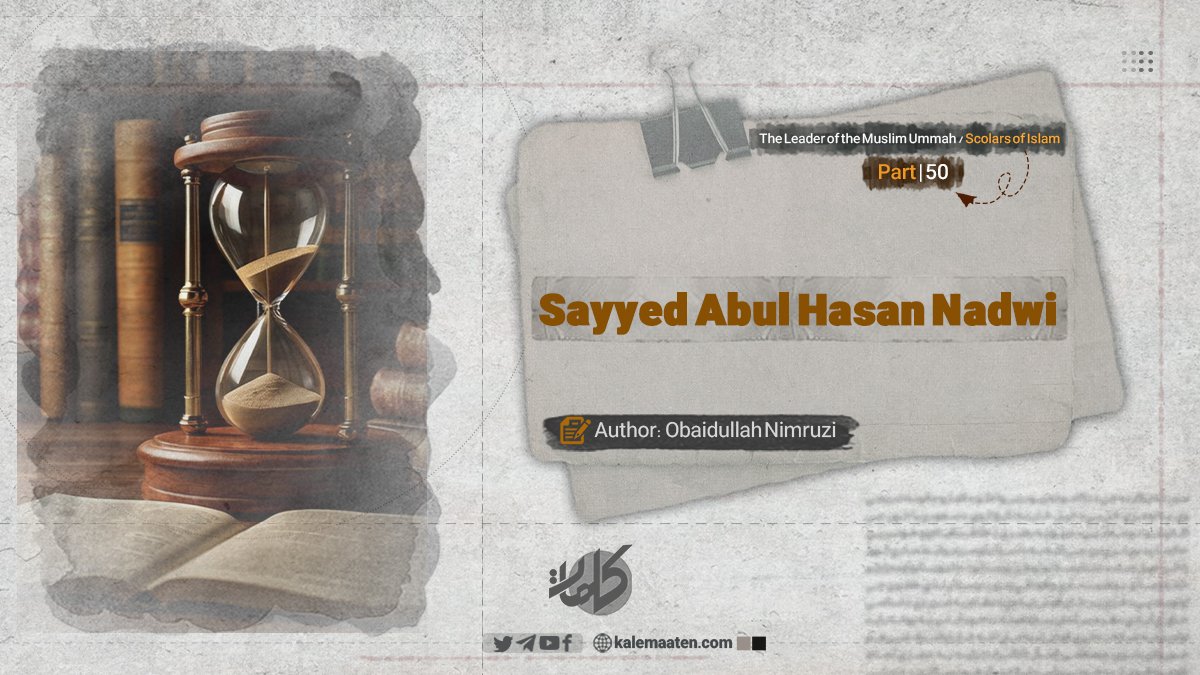
Author: Obaidullah Nimruzi
Allama Sayyed Abul Hasan Nadwi ‘May Allah have mercy on him’ (Part 50)
A great man in the field of Da’wah (invitation) and reformation
Da’wah and Invitation in the Path of Allah:
Hazrat Allama Nadwi, from the very beginning of his life, was dedicated to the Islamic Ummah. For this reason, he tirelessly worked to reform the Islamic Ummah through speeches, articles, encouragement, and persuasive efforts, including reform trips. This admirable characteristic became even more pronounced after he established a relationship with the leader of guidance and compassion for the Ummah, the great supplicant, Hazrat Mawlana Ilyas, may Allah have mercy on him. This relationship doubled the light of guidance in his life, and he found a new direction upon entering the breadth of public calling. With the prayers of his parents, brother, and the esteemed Hazrat Sheikh Al-Arab wa Al-Ajam, Hazrat Mawlana Hussain Ahmad Madani, along with other scholars, he achieved even more successes, and Allah Almighty blessed him in his calling and reformation efforts.
Mawlana Nadwi was a preacher everywhere. In Lucknow, for instance, he paid great attention to Jama’at Tabligh and maintained a deep relationship with it. On Friday nights, he would go out to the villages and surroundings to prepare the students for this important task.
Bilal Abdulhai Hassani Nadwi writes:
“When Mawlana came to Lucknow, he began his preaching efforts alongside the students connected to him. On Fridays, after evening prayers, they would take essentials and walk to Malhoor, which was about ten to twelve kilometers away. From there, the congregations would go to the surrounding villages and neighborhoods.”
Mawlana’s Prolonged Efforts in This Field:
Hazrat Mawlana Nadwi recognized the importance and necessity of this type of Da’wah movement. He constantly felt the burden of the depression, weaknesses, neglect, and evasions of the Islamic Ummah regarding religion, which drove him to travel to both distant and nearby areas for this purpose. In every possible way, he endeavored to make a meaningful impact. Although Mawlana Nadwi was primarily a school teacher, his lofty thoughts and reflections were not confined to the four walls of the school and textbooks; rather, he contemplated the challenges faced by Islamic society at large. While seated in Nadwa, his expansive worldview encompassed the global condition, motivating him to work toward its reform.
He was in India, yet he thought about America and Europe, as well as about improving conditions in the Arabian Peninsula, Egypt, Africa, Algeria, Sudan, and beyond. Yes, he transcended boundaries and thought of everyone. Without a doubt, Allama Nadwi was a masterful author and writer; it can be said that he was one of the most successful and comprehensive authors of the present era. Some of his works have been published more than a hundred times and translated into many of the world’s most common languages. However, this important and esteemed work of writing never led him to complacency regarding religion; rather, he worked diligently in every field, which, along with his awakened spirit, enabled him to leave behind some of the most valuable literary masterpieces in the world.
Mawlana Nadwi was an ascetic, a worshiper, and a night devotee. Yet, he did not stop at these pursuits; he nurtured and invited others into the calling. His sound and effective efforts produced great outcomes, as previously mentioned. Mawlana Nadwi traveled with other students to distant and nearby villages for preaching, where they spent nights in mosques, engaged in deep reflection and supplication.
Continues…



